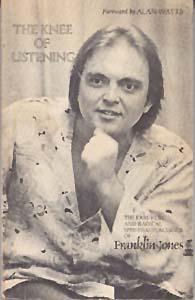
The Life and Understanding
of
Franklin Jones
Copyright 1971 By Franklin Jones
All rights reserved
Chapter 9: The Death of Narcissus
From the late summer of 1966 until I left for the Lutheran Seminary at Philadelphia the following August I was a disciple of Rudi without qualification. I performed the internal and external work and surrender he prescribed, and I enjoyed the wonderful effects of his discipline.
My marriage became yoga, my work became yoga, and my life became yoga. I enjoyed a state of physical, mental and moral well-being that I had never known since I was a boy, and I exceeded even that in these realizations of maturity. I learned the great pleasures of self-control and purity, of cleansing work and discipline, and all of the wholesome effects that social communication and outward love bring to one who has exercised himself in an erratic solitude.
I even became a wholly acceptable Christian. There seemed no necessary obstacle in the language of Christianity, and I began to enjoy the creative exercise of adapting my knowledge of truth to the historical and dogmatic language of the church. My studies in Greek also gave me great pleasure, and my attitude of unobstructed work made me excel as a student.
The seminary at Philadelphia offered a one thousand dollar fellowship, which would cover all the usual expenses of tuition, books, and a portion of the rest of one’s living. They proposed a series of questions to be answered in the form of an essay by all those who wanted to apply for the fellowship. I thought it would be immense fun if I could win this fellowship in spite of my background, and my thought and attitude toward Christianity. I wrote a long essay in answer to the questions. They dealt with autobiographical matters and thoughts relating to theology and social attitudes. It was a good test to see just how well I could represent myself and speak the language of a Christian. And I won! I had become a successful religious impostor.
I also did some writing for the completion of requirements for the M.A. degree at Stanford. I wrote a long, semi-autobiographical novella in order to satisfy my “incomplete” in the creative writing course. Wallace Stegner accepted it as actual writing, acceptable for course credit, but he was vehement in his denial of its literary value. He apparently gave the work to some of his students, and they agreed with him that, whatever it was, it was not “literature.”
I was not sure whether to take their resistance as censure or, since I knew very well what they considered viable “literature,” a compliment. At any rate, I did not persist in defending the writing beyond a certain point. Once it was reluctantly accepted for credit, I went to work preparing a thesis for the degree.
I wrote a long study on the aesthetic theories of Gertrude Stein, which I am sure still exists somewhere in the stacks at the Stanford library. I used the work to expand critically on many of the motives that had supported me as a writer, and I showed how these researches ultimately concerned not “literature” in the usual sense, but an attitude and a search that corresponded to otherwise philosophical, psychological and spiritual efforts. My thesis was developed by the addition of Jung’s studies in alchemy and the psyche, various writers on psychology, philosophy and the philosophy of art, and even the writings of Krishnamurti, who seemed, like myself, to be concerned with the problems of mind and art.
As I said earlier, my own career as a writer had been stimulated by various modern sources, of which Gertrude Stein was a primary example. In general, these people thought they were doing something new or revolutionary with the abilities of language to describe, signify, perform or be something. But I knew they were actually, if not self-consciously, doing something with the mind, with life, with consciousness itself. And although this might represent an unusual and revolutionary activity in Western literature, it was not in fact something new in the history of human activity.
End of chapter due to copyright restriction
For further reading go to:
